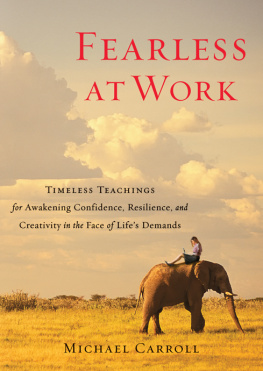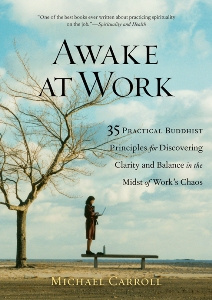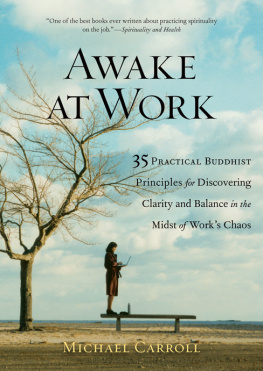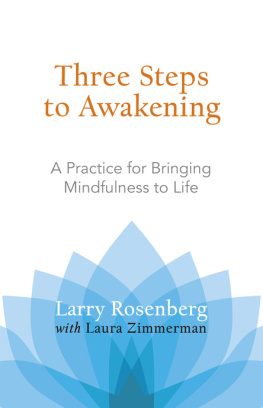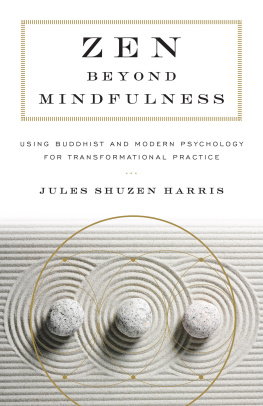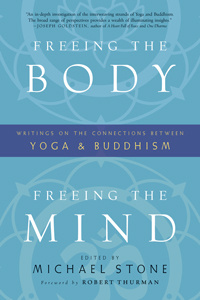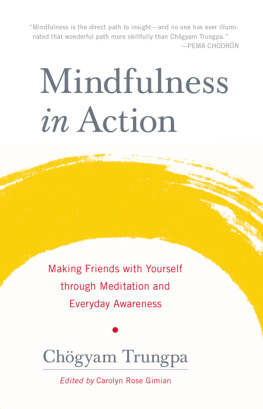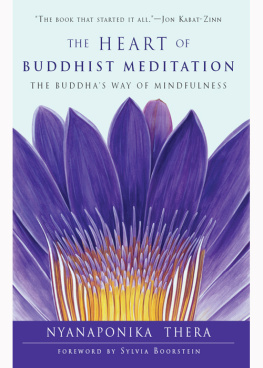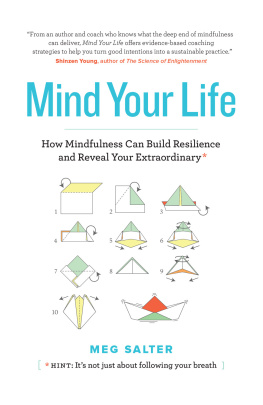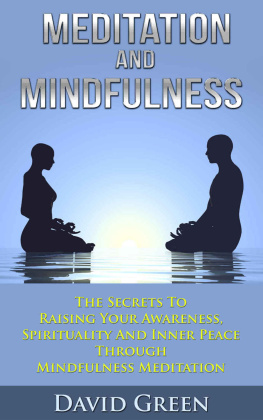A valuable book for our time. It is an infusion of intelligence and deep sanity into a subject that, for many, has become a daily experience of relative madness. Michael Carrolls many years of study and deep experience in both Buddhist practice and the workplace come shining forth in these pages.
Geoffrey Shugen Arnold, Sensei, Abbot, Fire Lotus Temple, Zen Center of New York City
Utterly trustworthy, profound, and pragmatic, this new book expresses in beautiful language how to use Buddhist principles to transform our work life into a source of confidence, goodness, and happiness.
Susan Piver, author of The Wisdom of a Broken Heart
ABOUT THE BOOK
Work is such a crucial part of our life, and yet we often struggle withand feel overwhelmed bythe numerous challenges it presents us. Whether its job insecurity, making peace with or leaving an unfulfilling job, or dealing with office conflicts, we often experience fear and a sense of groundlessness just at a time when we want to be our most creative and resilient. Drawing on Buddhist philosophy, Michael Carroll, a longtime human-resources executive, meditation teacher, and executive coach, explains how the practice of mindfulnessfull awareness of our moment-to-moment experiencecan help us become more confident and open to possibility in our work life. He offers a system of potent, inspiring principles that we can use as a practice for helping us work with our insecurities and awakening our natural bravery, resourcefulness, and resilience.
For over two decades MICHAEL CARROLL worked on Wall Street and in the publishing industry, holding executive positions at Shearson Lehman Brothers, Paine Webber, Simon & Schuster, and the Walt Disney Company. Founding director of AAW Associates, Carroll consults with major corporations on bringing mindfulness into the workplace. He is a longtime student of Buddhist meditation and an authorized teacher in the lineage of Chgyam Trungpa. Carroll has taught mindfulness meditation at the Wharton School of Business, Columbia University, Kripalu, and the Cape Cod Institute. For more information, visit www.awakeatwork.net.
Sign up to learn more about our books and receive special offers from Shambhala Publications.

Or visit us online to sign up at shambhala.com/eshambhala.
FEARLESS AT WORK

Timeless Teachings for Awakening Confidence, Resilience, and Creativity in the Face of Lifes Demands
MICHAEL CARROLL

Shambhala
Boston & London
2012
Shambhala Publications, Inc.
Horticultural Hall
300 Massachusetts Avenue
Boston, Massachusetts 02115
www.shambhala.com
2012 by Michael Carroll
Cover photograph of elephant Jake Wyman
Businesswoman working on a laptop Glow Images, Inc/Getty Images
Composite photograph by Jim Zaccaria
Cover design by Kathleen Lynch/Black Kat Design
Images
.
, Stoneware luohan, from Northern China, The Trustees of the British Museum. Reprinted by permission.
by Mark R. Hurwich.
All rights reserved. No part of this book may be reproduced in any form or by any means, electronic or mechanical, including photocopying, recording, or by any information storage and retrieval system, without permission in writing from the publisher.
Library of Congress Cataloging-in-Publication Data
Carroll, Michael.
Fearless at work: timeless teachings for awakening confidence, resilience, and creativity in the face of lifes demands / Michael Carroll.
p. cm.
Includes bibliographical references.
eISBN 978-0-8348-2809-4
ISBN 978-1-59030-914-8 (pbk.: alk. paper)
1. Self-confidence. 2. Resilience (Personality trait) 3. Creative ability. I. Title.
BF575.S39C37 2012
294.3444dc23
2012009629
To:
Chime Lhamo for offering me her fierce protection
Dudjom Rinpoche for planting the vital seed
And the Makkyi Rabjam for establishing fearless presence
CONTENTS
Rediscovering our natural confidence
BEFORE WE BEGIN, I would like to invite you to take a short survey. In fact, the survey has only one question, so it wont take very long. In my role as a business consultant and executive coach, I often ask my clients to complete this single-item questionnaire, and I will ask you to do the same. Remember: there are no wrong answers, so trust yourself!
Confidential:Official Workplace Survey*
Instructions: Complete the following sentence with the very first word that comes to mind
1. At work, I want to be____________________________.
* survey developed by AAW Associatesall rights reserved
While no scientist has vetted my Official Workplace Survey as statistically reliable, I can report that there are some patterns to the responses, and here are the six most frequent answers to date:
Happy
Successful
Stress-free
Effective
Fulfilled
Appreciated
Sound familiar? Needless to say, such aspirations come as no surprise. Given the demands and relentless pace of our modern-day workplace, it is little wonder that most of us would like a little stress-free happiness on occasion. Success and fulfillment? A little appreciation for a job well done? Isnt that what we are all looking for at work?
After forty-five years of making a living and thirty-seven years of Buddhist training, Im not so sure. My survey indicates that most of us think we want to be happy, successful, and stress-free at work, but we also know that such aspirations are wishful thinking. We all know that work offers both success and failure, happiness and angst. We know that work, indeed all of life, unavoidably presents both rewards and penalties, joys and disappointments. So, while most of us may wish to be happy and successful at work, what we really want, if we bring our aspirations down to earth, is to be confident: confident that no matter what work offers upsuccess or failure, happiness or disappointment, recognition or indifferencewe can unshakably rely on ourselves to be self-assured, resourceful, and at our ease.
But somehow, for so many of us, such workplace confidence seems elusive, and instead of feeling resourceful and resilient, we too often find ourselves hoping for success, chasing happiness, craving rewards, and fearing the worst.
In 1998, after ten years of working for a major publishing firm, I was laid off. Our company had been acquired, and I, along with many other executives, was displaced and invited to leave. For the most part, we were all treated well in our departure, and I, for one, left with few hard feelings. Yet I was worried about my future prospects.
On my final day I spent my time saying farewell to some close colleagues, and I recall a particularly insightful conversation with a division president, Sharon, which to this day reminds me to step past my aspirations and, instead, confidently wake up to my life.
After spending several minutes reminiscing, I began to wrap up our conversation and, with a shake of hands, turned to leave Sharons office when she said, Michael, whats the matter?
I turned and paused before dutifully responding, Whats the matter? What do you mean whats the matter? I lost my job!
And she gently asked, So whats the worst that could happen?
Whats the worst that could happen? I responded with a bit of panic in my raised voice. I could lose my home, my savings, and be out on the street with my family. Thats what could happen, I pleaded.
Next page
